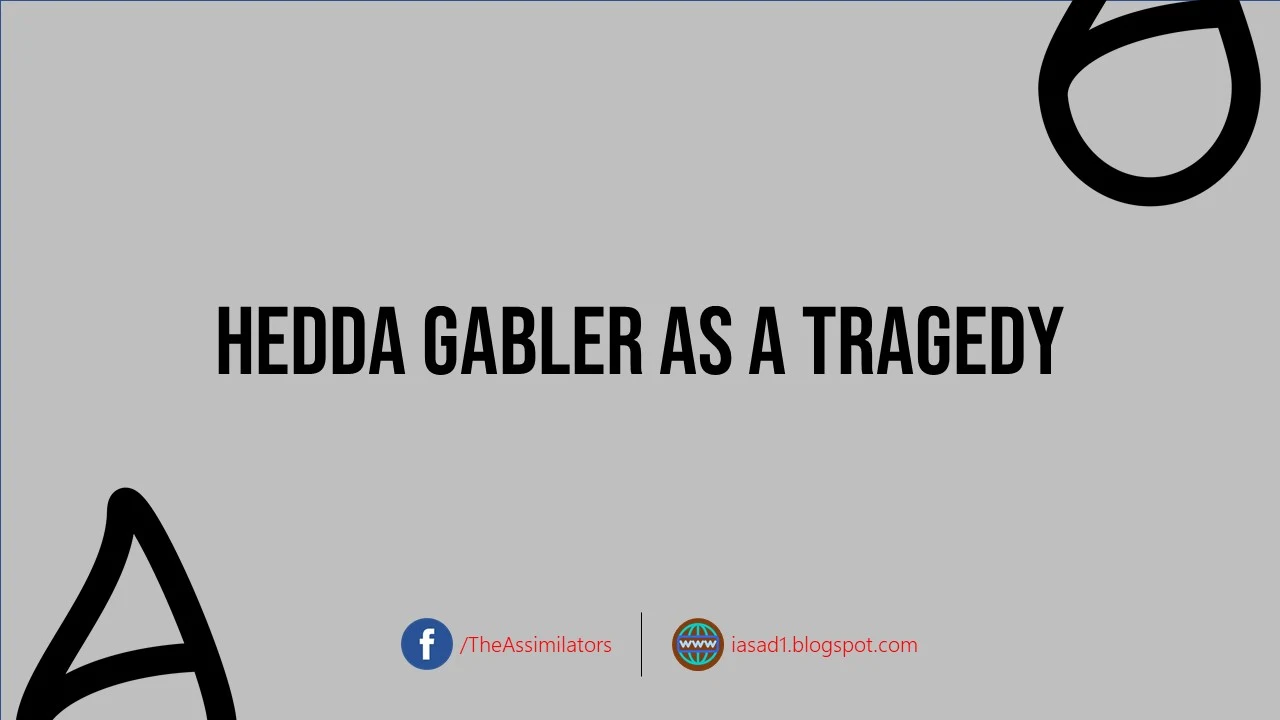Introduction
Hedda Gabler as a dramatic personage has many things in common to that of a tragic hero. From her social responsibility to her mortal boredom to her manipulative tactics and to her suicide. Hedda Gabler is a tragedy but of a different kind. It is sometimes referred as a liberal tragedy. Liberal tragedy is a kind of tragedy in which the protagonist is depicted to fight against the set rules of a society. Hedda, in this regard, is a liberal tragic heroine because she may not be acceptable in her society due to her masculine traits. Like many other tragic characters, Hedda suffers from internal as well as external conflicts. Internal conflicts in the sense of her boredom and the mental agony of being unable to perform the deeds that Hedds herself desired while the external conflicts are the limitations of her rigid society upon women of her age.
Hedda's Noble Birth
Just like classical tragedies, Hedda Gabler belongs to a noble family or the family of the upper class. To simply put, Hedda is the daughter of a reverential general known as General Gabler. He leaves behind a pair of pistols, a writing desk and a piano that are also seen in Tesman's house when Hedda is married to George Tesman. These left-outs serve as a decent symbol to carry out different meanings of the play. For instance, in the setting of Act 1, we see Hedda's piano placed in the drawing-room but in Act 2, we are made noticed about the change that the piano has been changed by a small writing table, that might be possibly dedicated for Tesman, thus putting the importance of Hedda Gabler at the side and we practically see this in action in Act 4 when Tesman and Thea are reconstructing the burnt book of Loevborg. Tesman bluntly says to Hedda that she is no more useful to them:
HEDDA.
Is there nothing I can do to help you two?
TESMAN.
No, nothing in the world.
Peripetia in Hedda Gabler
A tragedy is incomplete without the element of Peripeteia in it. Peripeteia means the sudden reversal of a situation that brings about the tragic ending of the play or the character. Hedda Gabler is no exception in regard to Peripeteia. We see in the play that Hedda wants to shape a man's destiny. She cannot exert it upon her husband because she tried and failed. So, Hedda shifts her expectations and manipulative tactics to newly reformed Loevborg. At first, she coaxes him to go into the Bachelor's party and to have a crown of vine leaves. But in return, he lost the manuscript during the process of excessive drinking. This distains Hedda but she gives him one pistol to die "beautifully". But the situation changes and the one who was trying to shape the destiny of a person, is herself caught in the trap of dominance. She becomes fully in control of Judge Brack after he reveals that the pistol that accidentally went off, killing Loevborg, belonged to her. Hedda realized that she could do nothing to escape from his grip but she found a way to get out of the Peripeteia and it was the suicide.
Hedda's Suicide
So far, this topic has already been discussed in one of the previous questions but for your ease, it is given below:
The play ends with Hedda committing suicide by shooting herself in the temple. There can be numerous reasons behind her commitment. One can be to prove her courage; to put an end on her boredom; to not to be "plagued with any responsibilities" (children in this case) and to silence Judge Brack and his blackmailing. But the question arises, is Hedda's committing suicide makes her a tragic character? The answer is as complex as her character. Her suicide is tragic in the sense that her limited exposure in society compels her to do questionable deeds. If her society was lenient towards women, such things would not have happened. And she could have accepted her limitations and lived peacefully but this would drop her rank as the Hedda Gabler.
Conclusion
The manifestation of the discussion stated above marks Hedda Gabler as a tragic play but in the modern sense. Through the tragic character of Hedda Gabler, Ibsen wants to emphasize that the female characters or protagonists can be equally tragic as men.
Sources and Suggested Readings
- http://www.askliterature.com/drama/henrik-ibsen/hedda-gabler/hedda-gabler-as-tragedy/
- https://www.facebook.com/325360598269718/posts/hedda-gabler-a-modern-tragedyhenrik-ibsens-hedda-gabler-is-a-definitive-look-at-/707404356732005/
- https://www.shmoop.com/study-guides/literature/hedda-gabler/analysis/genre
- Lectures of Sir Hassan Akbar
- Hedda Gabler as a Tragedy - KM Literary Series - Hedda Gabler - Page 302


